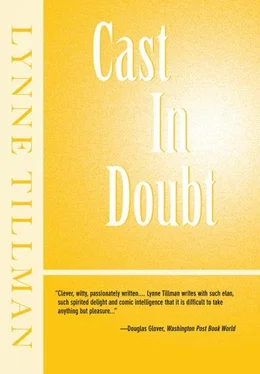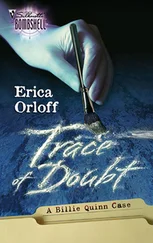It’s so nourishing to talk with Gwen. We talk and talk. I embellish the stories about Alicia and Roger, and then offer my tale of Helen. Gwen listens, scrutinizing me, getting the story. Her lips caress and hold tight a Greek nonfiltered cigarette. Her dark eyes, which slant upward, are narrowed. When I’ve finished, she repeats, You’ve been out of the States too long, Lulu, you’re becoming one of those expatriates. She waves her hands in the air, indicating, I suppose, a dizzy expatriate, a confused one. A predictable expatriate, she explains. Then she adds, Horace, girls like Helen are a dime a dozen. Pish-posh! I exclaim, like a character out of Dickens.
It’s been some time since I’ve seen Helen on her terrace, and she hasn’t come for dinner at Christos’ restaurant. One of the beauties of this place is that one can make oneself scarce, it’s true. One can disappear at will, for a time. Yet Helen may be angry with me. It is no fault of mine that John is living at Alicia’s house, surrounded by bougainvillea, and that he is cared for by such a lovely older woman, though to me she is a younger woman. Isn’t everyone younger than I? Helen may need to blame me, but I am blameless. Of this event, anyway. The last time we dined, in the condition I was, I may have blurted out something about suicide, about her having had a twin who died. Too much time has passed since then. A few days’ absence is normal. And though, prior to Gwen’s arrival, I was furiously at work on my crime book, I was unsettled and concerned about Helen. I thought about her and that evening, and then repressed it. I said to myself it is nothing; but then I dwelled on her and it again, and yet I did and have done nothing. Actually I have been waiting to hear from her. But now I think I will send her a note. I will also ask Yannis to go to the market and buy her some flowers to accompany the note. I don’t think this can be viewed by Helen as another one of Horace’s impositions.
With Gwen here, my absence from home seems poignant. I’ve been here nearly as long as Helen’s been alive. I might become annoyed at Gwen’s harping on my being out of touch. No doubt I am, whatever that means. With the zeitgeist, with American life and day-to-day reality, whatever that may be, with the city, the polis. Politics were not why I left America. I’d lost my lover of many years. I had a publisher, a contract, books to do. I was tired of everyone and everything, just as I am now, come to think of it. I had a little money to play with, as I was and am privileged. I loathe people who hide their means of support, though I am no Marxist. I identified during the sixties with James Baldwin, especially when he fled to France, and though I’m not black, and he’s years younger, and I didn’t suffer the poverty and discrimination he did, I felt close to him. I still feel close to him because of these things and certain details like our bulging eyes and predilection for men. I always thought I’d meet him, but fate has not been kind to me in that respect. He’s a marvelous writer and much misunderstood. Gwen knew of my feelings for him, and she’s the only person I ever told. She’s met him. Gwen knows everyone. She is more than twenty years younger than I. I must ask her how Baldwin is these days. If anyone would know, she would.
The sea is remarkably calm now and the only sounds one hears are small waves slapping gently against the harbor walls. It is quiet, peaceful. The States is a maelstrom. All those products, and people and clubs, and TV shows. I watched television once only. It gave me a headache. There is some noise here of course. On Sundays the army marches around the harbor. Gwen will watch the parade, laugh her sharp little laugh, and flick the ashes of her cigarette. I never would have marched in protest marches. I couldn’t, carrying a banner proclaiming, “U.S. Out Of Vietnam,” or “Women’s Bodies, Women’s Lives,” and not because I don’t believe in the truth of both, but because I abhor the idea of wearing a placard or button. I hate to think that a phrase could in any way even for an instant define me. That I could be summed up that way is appalling, absolutely terrifying. I immediately conjure a tombstone upon which my life is reduced to an engraved epitaph.
I am more than a little ambivalent lately. Gwen has never marched, I’m sure of that. Were I to ask her she’d arch one eyebrow and shoot me a certain look, as if to reproach me for reading her so badly. She and I share ambivalence like a biscuit we might break in half for tea. She’s more angry than I, I believe, but her anger is carefully muted through sarcasm. This may or may not reveal some truth beneath. I’m sure she still fights, verbally, as she always has, especially when she’s tied one on. Gwen loves a wickedly good contest, one of wits, of course. For her there is almost no other contest, except perhaps for love. The love of a bad man, usually.
Some fights must be fought — the Civil War, World War II. I would have liked to have been at Stonewall as a fly on the barroom wall. But I hate physical violence. I was not brave enough, when I was living in Boston, to go on a freedom ride to the South. I drank a toast to them in Gwen’s apartment in Cambridge; she drank and said nothing. I cried when King died; Gwen wrote me that she was so drunk that night she lay down in the gutter on Canal Street. But it was not at all clear whether her drinking was in relation to King’s death. She allowed that to remain ambiguous. About matters pertaining to civil rights or to the fact that she is black, she has, over the years’ said little, almost nothing. I am sure she carries all this within her where she nurses her secret self, the self that would not rest easy in the company of whites, not even men like myself whom she loves and trusts. But I don’t really think Gwen trusts anyone. Her cynicism is deeper than the sea out my window and beyond. I can’t bear to think about it. I wonder if Gwen’s script — Dark Angels — holds these secrets, these surprises, exposes the Gwen I am not privy to. I’ve often thought that, that her true self and outrage would find release in her personal writing. I wonder if on this trip she will show me any of it. But I know, in my heart, beaten but still beating, that she will not.
Gwen is asleep in the room beneath me. Her proximity provides a homey comfort. That Gwen represents for me a kind of security and sense of rightful place is odd, as she is edgy, always on the edge, always about to fall over to the other side. I sigh audibly and look out again to the sea and to Helen’s terrace. It is empty. The sea is choppy.
It is beautiful here. Gwen must or will surely recognize that. Truth must be beauty. Beauty its own truth. With a full heart I go to the typewriter and confront Stan Green as he studies and tracks the young rich boy, stalking him, stalking him, watching and waiting for him to return to the scene of the crime. Blasting with energy I type more than ten manuscript pages. I will make my deadline after all if I continue with such alacrity. Just a little more detective-like analysis and Stan Green will nail the young spoiled criminal to a cross of his own making. I think it will be in a diary he’s kept, a small book written in code. Green will crack it.
The sky is darkening. Gwen is still asleep. Perhaps she took a pill. Suddenly it comes to me that the word analyst on Helen’s diary may apply as much to her father as to herself. That is, I had assumed she was in analysis, though I never inquired, and now, I remember quite distinctly, she told me her father was a shrink. Her psychological astuteness may indeed be an inherited trait, or one encouraged from birth. Perhaps placing analyst in block letters on her diary’s cover was an ironic gesture. She may have been one of those children who was sent to a psychiatrist at a young age. I don’t think Helen was a twin, after all. I cannot imagine that that fact, were it so, wouldn’t have risen to the surface in these past months. But I do think her sister died. There was some great family tragedy, I am certain.
Читать дальше












